English Standard Version 2016
DESCRIPTION
The Bible
This Book [is] the most valuable thing that this world affords. Here is Wisdom; this is the royal Law; these are the Iively Oracles of God. With these words the Moderator of the Church of Scotland hands a Bible to the new monarch in Britain’s coronation service. These words echo the King James Bible translators, who wrote in 1611, God’s sacred Word . . . is that inestimable treasure that excelleth all the riches of the earth. This assessment of the Bible is the motivating force behind the publication of the English Standard Version.
Translation Legacy
The English Standard Version (ESV) stands in the classic mainstream of English Bible translations over the past half-millennium. The fountainhead of that stream was William Tyndale’s New Testament of 1526; marking its course were the King James Version of 1611 (KJV), the English Revised Version of 1885 (RV), the American Standard Version of 1901 (ASV), and the Revised Standard Version of 1952 and 1971 (RSV). In that stream, faithfulness to the text and vigorous pursuit of precision were combined with simplicity, beauty, and dignity of expression. Our goal has been to carry forward this Iegacy for this generation and generations to come.
To this end each word and phrase in the ESV has been carefully weighed against the original Hebrew, Aramaic, and Greek, to ensure the fullest accuracy and clarity and to avoid under-translating or overlooking any nuance of the original text. The words and phrases themselves grow out of the Tyndale King James Iegacy, and most recently out of the RSV, with the 1971 RSV text providing the starting point for our work. Archaic Ianguage has been brought into Iine with current usage and significant corrections have been made in the translation of key texts. But throughout, our goal has been to retain the depth of meaning and enduring quality of Ianguage that have made their indelible mark on the English-speaking world and have defined the Iife and doctrine of its church over the Iast five centuries.
theWord Features
• Fully searchable text
• Footnotes (F key toggles)
• Cross-references (X key toggles)
• Passage Headings (H key toggles)
• Poetry formatting or Verse-per-line (P key toggles)
• Words of Jesus Christ in red text (J key toggles)
World English Bible (Strong’s Numbers, Glossary & Apocrypha)
Description:
Why was the World English Bible translated?
There are already many good translations of the Holy Bible into contemporary English. Unfortunately, almost all of them are restricted by copyright and copyright holder policy. This restricts publication and republication of God’s Word in many ways, such as in downloadable files on the Internet, use of extensive quotations in books, etc. The World English Bible was commissioned by God in response to prayer about this subject.
Because the World English Bible is in the Public Domain (not copyrighted), it can be freely copied, distributed, and redistributed without any payment of royalties. You don’t even have to ask permission to do so. You may publish the whole World English Bible in book form, bind it in leather and sell it. You may incorporate it into your Bible study software. You may make and distribute audio recordings of it. You may broadcast it. All you have to do is maintain the integrity of God’s Word before God, and reserve the name “World English Bible” for faithful copies of this translation.
How was the World English Bible translated?
The World English Bible is an update of the American Standard Version (ASV) of the Holy Bible, published in 1901. A custom computer program updated the archaic words and word forms to contemporary equivalents, and then a team of volunteers proofread and updated the grammar. The New Testament was updated to conform to the Majority Text reconstruction of the original Greek manuscripts, thus taking advantage of the superior access to manuscripts that we have now compared to when the original ASV was translated.
What is different about the World English Bible?
The style of the World English Bible, while fairly literally translated, is in informal, spoken English. The World English Bible is designed to sound good and be accurate when read aloud. It is not formal in its language, just as the original Greek of the New Testament was not formal. The WEB uses contractions rather freely.
The World English Bible doesn’t capitalize pronouns pertaining to God. The original manuscripts made no such distinction. Hebrew has no such thing as upper and lower case, and the original Greek manuscripts were written in all upper case letters. Attempting to add in such a distinction raises some difficulties in translating dual-meaning Scriptures such as the coronation psalms.
The World English Bible main edition translates God’s Proper Name in the Old Testament as “Yahweh.” The Messianic Edition and the British Edition of the World English Bible translates the same name as “LORD” (all capital letters), or when used with “Lord” (mixed case, translated from “Adonai”,) GOD. There are solid translational arguments for both traditions.
Because World English Bible uses the Majority Text as the basis for the New Testament, you may notice the following differences in comparing the WEB to other translations:
The order of Matthew 23:13 and 14 is reversed in some translations.
Luke 17:36 and Acts 15:34, which are not found in the majority of the Greek Manuscripts (and are relegated to footnotes in the WEB) may be included in some other translations.
Romans 14:24-26 in the WEB may appear as Romans 16:25-27 in other translations.
1 John 5:7-8 contains an addition in some translations, including the KJV. Erasmus admitted adding this text to his published Greek New Testament, even though he could at first find no Greek manuscript support for it, because he was being pressured by men to do so, and because he didn’t see any doctrinal harm in it. Lots of things not written by John in this letter are true, but we decline to add them to what the Holy Spirit inspired through John.
With all of the above and some other places where lack of clarity in the original manuscripts has led to multiple possible readings, significant variants are listed in footnotes. The reading that in our prayerful judgment is best is in the main text. Overall, the World English Bible doesn’t differ very much from several other good contemporary English translations of the Holy Bible. The message of Salvation through Jesus Christ is still the same. The point of this translation was not to be very different (except for legal status), but to update the ASV for readability while retaining or improving the accuracy of that well-respected translation and retaining the public domain status of the ASV.
theWord Version includes Strong Numbers (Not on every word but many if not most.), Glossary Dictionary and Apocrypha
theWord Features
Bible
- Strong’s Numbers
- Headings
- Verse popups
- Cross References
- Fully searchable text
- Footnote(s)
- Easy navigation of topics via Bible tree or Verse Reference Entry
- Special Text Colors
- Normal: Text
- Greek: λογος
- Hebrew: א
Glossary
- Verse popups
- Fully searchable text
- Easy navigation of topics via topics tree display.
- Special Text Colors
- Normal: Text
- Hyperlink: Link | Jn 3:36
Apocrypha
Books included: Tobit, Judith, Esther (Greek*), Wisdom of Solomon, Sirach, Baruch, 1 Maccabees, 2 Maccabees, 1 Esdras, Prayer of Manasses, Psalms 151, 3 Maccabees, 2 Esdras, 4 Maccabees, Daniel (Greek*)
*Greek means they included portions translated from the Greek in addition to the Hebrew.
- Verse popups
- Fully searchable text
- Footnote(s)
- Easy navigation of topics via topics tree display.
- Special Text Colors
- Normal: Text
- Hyperlink: Link | Jn 3:36
- Hebrew: א
theWord Bible Software
theWord is the result of a great, ongoing effort!
If you already have version 3 or later go here for the upgrade.
theWord is used around the world in multiple languages. We pray it will bless your life.
Appreciative users through the years have given to support theWord development. You can do this with a gift as many appreciative users do via theWord Appreciation by doing so you are truly helping provide this high-quality Bible study software, free of charge to everyone.
Want to know what others think of theWord? Read theWord Bible software Guestbook.
Contains:
- Main program
- More than 350 “Free to You” titles also available in “Add Titles” from within theWord
- King James Bible of 1611/1769 with Strong’s numbers
- English Standard Version, 2011 Edition, The Holy Bible (Good News Publishers)
- Holman Christian Standard Bible (Holman Bible Publishers)
- NET Bible (New English Translation), Limited Notes Edition
- Textus Receptus (1550/1894) Greek New Testament with Strongs’ Numbers and parsing information
- Westminster Leningrad Codex Old Testament
- Mickelson’s Enhanced Strong’s Greek and Hebrew Dictionaries
- Robinson’s Morphological Analysis Codes
- Nave’s Topical Bible
- Torrey’s New Topical Textbook
- Hole’s Commentary on the New Testament and selected books of the Old Testament
- The Gospels Compared
- All of Grace (C.H.Spurgeon)
- Bible Doctrines (M.G.Cambron)
- The Complete Sunday School Atlas (S.W.Walter)
- Miller’s Church History (Andrew Miller)
- Pilgrim’s Progress (John Bunyan)
- Rightly Dividing the Word of Truth (C.I.Scofield)
- Treasury of Scripture Knowledge
- Day by Day by Grace (Bob Hoekstra)
Note: Serial Number is not needed – “This product is Free to You”
International Standard Version Bible (ISV)
The ISV is a totally new work translated directly from the original languages of Scripture and derived from no other English translation.
The ISV was produced by Bible scholars who believe that “All Scripture is inspired by God and is useful for teaching, for reproof, for correction, and for training in righteousness.” (2 Timothy 3:16 ISV) It takes advantage not only of the most ancient manuscripts available, but also of the most recent archaeological discoveries. The ISV is the first English Bible conceived, designed, translated, and formatted primarily for a computer-literate generation. It is being produced entirely in a computer-aided media (CAM) format.
The ISV is Sensitive to Poetic Literary Forms in the Original Text. It treats subtle nuances of the original texts with special care. For example, several passages of the Bible appear to have been rendered in poetic form when first penned by their authors. The ISV has meticulously crafted these original passages as true poems—thus communicating a sense of their original literary form as well as translating the original intent of the New Testament author.


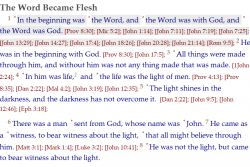
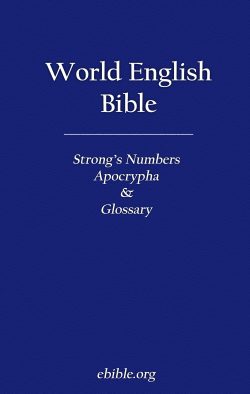
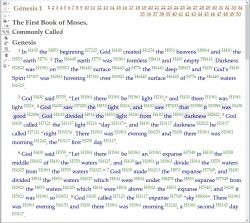
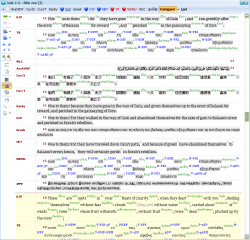
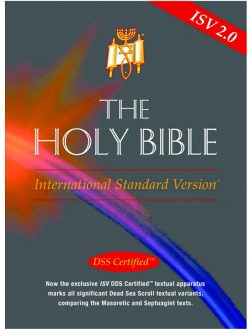
theWord Bible Software Upgrade
theWord is the result of a great, ongoing effort!
This is the upgrade package if you have version 3 or later.
If you don’t yet have theWord go here for the full installation.
theWord is used around the world in multiple languages. We pray it will bless your life.
Appreciative users through the years have given to support theWord development. You can do this with a gift as many appreciative users do via theWord Appreciation by doing so you are truly helping provide this high-quality Bible study software, free of charge to everyone.
Want to know what others think of theWord? Read theWord Bible software Guestbook.
Contains:
Note: Serial Number is not needed – “This product is Free to You”